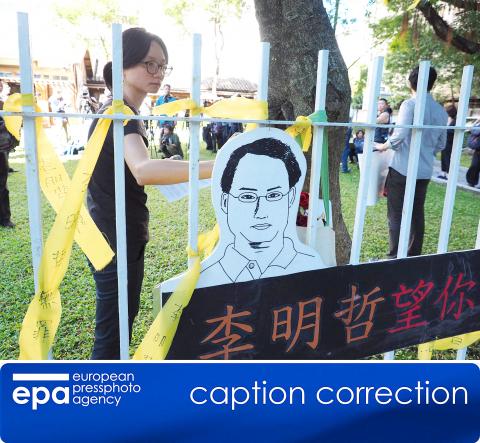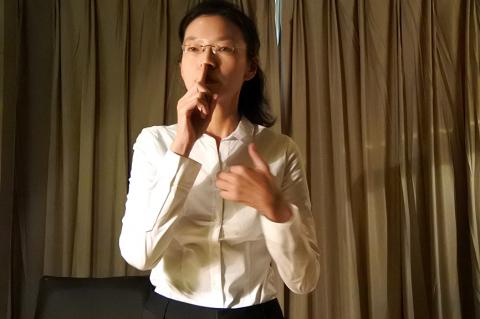A Chinese court yesterday sentenced Taiwanese human rights advocate Lee Ming-che (李明哲) to five years in prison for holding online political lectures and helping the families of jailed dissidents in a conviction demonstrating how Beijing’s harshest crackdown on human rights in decades has extended beyond China.
Lee’s trial was also China’s first known criminal prosecution of a nonprofit worker since Beijing passed a law in April last year tightening controls over foreign non-governmental organizations.
Lee went missing on March 19 after entering Zhuhai, Guang Province, from Macau. China did not announce his arrest until 10 days later.

Photo: David Chang, EPA
The Yueyang City Intermediate People’s Court in Hunan Province handed down the sentence after finding Lee guilty of subversion of state power.
Lee had confessed during his trial in September, which his wife, Lee Ching-yu (李凈瑜), dismissed as “a political show.”
His codefendant, Chinese national Peng Yuhua (彭宇華), was sentenced to seven years in prison.

Photo: CNA
Peng had also pleaded guilty, saying he had founded an organization called Palm Flower Co to pressure China to accept a multiparty political system and that Lee Ming-che was his deputy in charge of education.
Subversion of state power is a vaguely defined charge often used by Chinese authorities to muzzle dissent and imprison critics.
The court said both men said they would not appeal.
Lee Ching-yu, who attended the sentencing, said in a statement issued through her supporters: “A price must be paid in the pursuit of an ideal.”
“Striving for human rights for the underprivileged is a necessary dedication to promoting the progress of human civilization,” she said.
Supporters say that since the trial ended, Lee Ching-yu has been prevented from leaving her hotel room or meeting with anyone.
“Lee Ming-che took the risk despite knowing the dangers,” she said, adding that she was proud of him.
She said she was allowed to meet her husband for only three minutes, and he told her, through hand gestures, that he was wearing a covert listening device.
She said he told her to buy books for him, while she told him that the “free world” would continue to help in his rescue.
Former Democratic Progressive Party legislator Wang Li-ping (王麗萍), who on Monday accompanied Lee Ching-yu to Yueyang, but was deported, told a news conference in Taipei that China had monopolized jurisdiction over the case, despite the existence of cross-strait judicial agreements.
The case is a blatant example of Beijing seeking to extend its power while the Taiwanese government has acted passively, Taiwan Association of University Professors president Lin Hsiu-hsin (林秀幸) said.
Lee Ming-che was convicted for his online comments, a verdict that has grave implications for Taiwanese, Lin said.
Taiwanese have to either “comply with Chinese laws in Taiwan” or stay away from China, Lin said.
Judicial Reform Foundation executive director Kao Jung-chih (高榮志) said the trial ran counter to the rule of law, because Lee Ming-che’s lawyer gave up defending him, the right to review evidence and seek an appeal.
“The case does not concern Lee Ming-che alone, but all of us,” Kao said.
Taiwan Association for Human Rights secretary-general Chiu Ee-ling (邱伊翎) said they would continue to seek international assistance and present an account of the case at a convention of the UN Human Rights Council’s Working Group on Enforced or Involuntary Disappearances in Brussels in February, as China has not disclosed where Lee is being held.
Lee’s sentence was “incredibly harsh,” given the accusations against him and the lack of evidence, said Maya Wang (王松蓮), Human Rights Watch’s Hong Kong-based researcher.
“It’s probably designed as a warning to activists based outside China, particularly those in Hong Kong and Taiwan,” as Chinese President Xi Jinping’s ( (習近平) crackdown on dissent radiates beyond its borders, Wang said in an e-mail.
Amnesty International said Lee Ming-che was a victim of a politically motivated prosecution and that the evidence against him was not credible.
“He is the latest to suffer under the Chinese authorities’ relentless attack against human rights and democracy activists,” Roseann Rife, the group’s East Asia research director, said in a statement.

SECURITY: As China is ‘reshaping’ Hong Kong’s population, Taiwan must raise the eligibility threshold for applications from Hong Kongers, Chiu Chui-cheng said When Hong Kong and Macau citizens apply for residency in Taiwan, it would be under a new category that includes a “national security observation period,” Mainland Affairs Council (MAC) Minister Chiu Chui-cheng (邱垂正) said yesterday. President William Lai (賴清德) on March 13 announced 17 strategies to counter China’s aggression toward Taiwan, including incorporating national security considerations into the review process for residency applications from Hong Kong and Macau citizens. The situation in Hong Kong is constantly changing, Chiu said to media yesterday on the sidelines of the Taipei Technology Run hosted by the Taipei Neihu Technology Park Development Association. With

‘FORM OF PROTEST’: The German Institute Taipei said it was ‘shocked’ to see Nazi symbolism used in connection with political aims as it condemned the incident Sung Chien-liang (宋建樑), who led efforts to recall Democratic Progressive Party (DPP) Legislator Lee Kun-cheng (李坤城), was released on bail of NT$80,000 yesterday amid an outcry over a Nazi armband he wore to questioning the night before. Sung arrived at the New Taipei City District Prosecutors’ Office for questioning in a recall petition forgery case on Tuesday night wearing a red armband bearing a swastika, carrying a copy of Adolf Hitler’s Mein Kampf and giving a Nazi salute. Sung left the building at 1:15am without the armband and apparently covering the book with a coat. This is a serious international scandal and Chinese

A US Marine Corps regiment equipped with Naval Strike Missiles (NSM) is set to participate in the upcoming Balikatan 25 exercise in the Luzon Strait, marking the system’s first-ever deployment in the Philippines. US and Philippine officials have separately confirmed that the Navy Marine Expeditionary Ship Interdiction System (NMESIS) — the mobile launch platform for the Naval Strike Missile — would take part in the joint exercise. The missiles are being deployed to “a strategic first island chain chokepoint” in the waters between Taiwan proper and the Philippines, US-based Naval News reported. “The Luzon Strait and Bashi Channel represent a critical access

COUNTERINTELLIGENCE TRAINING: The ministry said 87.5 percent of the apprehended Chinese agents were reported by service members they tried to lure into becoming spies Taiwanese organized crime, illegal money lenders, temples and civic groups are complicit in Beijing’s infiltration of the armed forces, the Ministry of National Defense (MND) said in a report yesterday. Retired service members who had been turned to Beijing’s cause mainly relied on those channels to infiltrate the Taiwanese military, according to the report to be submitted to lawmakers ahead of tomorrow’s hearing on Chinese espionage in the military. Chinese intelligence typically used blackmail, Internet-based communications, bribery or debts to loan sharks to leverage active service personnel to do its bidding, it said. China’s main goals are to collect intelligence, and develop a